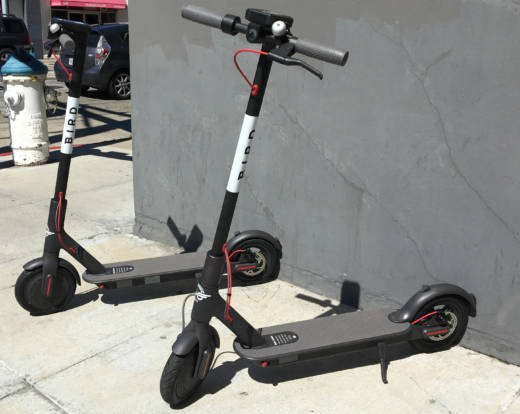The city’s sidewalks “are not dumping grounds for commercial scooters,” Herrera said. “Kids, parents with strollers, seniors or people in wheelchairs shouldn’t be tripping over scooters or forced into traffic to get around them. San Franciscans’ safety and public resources are not commodities for these companies to monetize. San Francisco has had enough of the mantra ‘move fast and break things.’ We are examining all of our legal options to protect the more than one million people who use San Francisco’s sidewalks every day.”
Early last year, Herrera’s office was successful in forcing Bluegogo, a now-defunct China-based dockless bike company, to remove its cycles from the streets. The Bluegogo episode prompted an ordinance by Peskin to require dockless bike companies to obtain SFMTA permits.
“Of course, we didn’t anticipate stationless scooters” when the dockless bike ordinance was written, Peskin said in an interview Monday. “I actually introduced legislation before Bird and Lime dumped hundreds of these devices on our sidewalks to give the San Francisco Municipal Transportation Agency the ability to permit these and set reasonable permit conditions. … I suspect these companies knew full well that this legislation was forthcoming and decided that they would rather ask forgiveness than permission.”
SFMTA spokesman Paul Rose said in an email Monday that the agency is working with Peskin to develop regulations for “motorized scooter sharing in the public right-of-way.”
He noted that while the electric stand-up scooters are not explicitly covered under the city’s transportation code, other legal requirements do apply.
“It is illegal to place a scooter (or any other object) in a manner that obstructs the sidewalk or other pedestrian paths of travel,” Rose said. “Also, state law prohibits riding motorized scooters on any sidewalk and requires that scooter riders wear helmets.”
He also said the city wants “any potential operators of new transportation services to work closely with us prior to launching a new program. While we welcome improved mobility options, we want to carefully consider the potential benefits and impacts of any new private transportation service to ensure that it serves the public interest.”
Bird and LimeBike did not respond immediately to requests for comment. However, San Francisco-based Spin maintained that it has been cooperative with the SFMTA and has taken steps to educate customers about the do’s and don’ts of scooter etiquette.
“This is the first time we’re hearing about this statement from the city attorney’s office,” Spin spokeswoman Rachel Starr said in an email Monday. “We have a policy that scooters must be ridden only on roads and bike lanes, and that they must be parked on wide sidewalks in the furniture zone — closer to the curb — so as not to impede pedestrian traffic and ensure public safety.”
Starr noted that Spin’s scooter app includes pop-ups informing users that riding on sidewalks is prohibited.
“Additionally, our in-house customer support team dispatches our crews whenever we receive a report of an improperly parked scooter that may be obstructing the right of way,” she said. “We’re committed to getting San Franciscans out of cars and using environmentally-friendly transportation options to help mitigate congestion and pollution in our city, but we understand the importance of addressing valuable concerns from the community around safety and appropriate usage of scooters. ”
Among the three firms, Bird gained early notoriety last fall when it distributed hundreds of its scooters in Santa Monica without informing the city. The city filed criminal charges, alleging that the company had failed to obtain business licenses and vendor permits. The company pleaded no contest in February and agreed to pay $300,000 and get the required licenses to settle the case.

